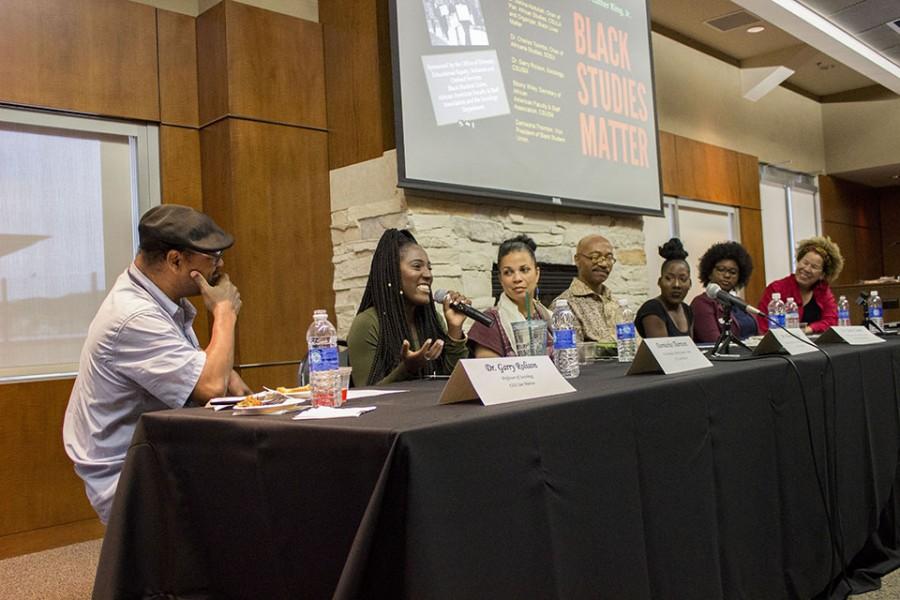CSU leaders express the need for black studies program
Panelists refer to personal experiences and frustration over lack of cultural inclusion
Panelists from left to right: Dr. Garry Rolison, Darniesha Thornton, Dr. Melina Abdullah, Dr. Charles Toombs, Daniesha Thornton, Ebony Wiley and Dr. Sharon Elise.
February 24, 2016
A panel of educators and students from three California State Universities made powerful arguments for the inclusion of black/Africana studies programs in colleges and universities across the nation on Feb. 17.
The Office of Diversity, Educational Equity, Inclusion and Ombud Services hosted Black Studies Matter on Wednesday, Feb. 17 at the Reading Room in Kellogg Library to discuss the inclusion of black/Africana studies programs throughout the CSUs.
Professor and Department Chair of Sociology Dr. Sharon Elise introduced the panelists. They included Dr. Garry Rolison, Ebony Wiley, Black Student Union President Daniesha Thornton and Vice President Darniesha Thornton, and Dr. Charles Toombs of SDSU and Dr. Melina Abdullah of CSULA, who is also an organizer of the Black Lives Matter movement.
As the event title was inspired by Black Lives Matter, Abdullah connected the movement to the recent demand for black studies programs.
“If we think about what’s happened since the founding of Black Lives Matter … it’s lifted up this idea of being unapologetically black,” said Abdullah.
“For 40 years, there has been a concerted effort that has been successful in helping us to think that we are best served by incorporating ourselves into the existing system … black people have been fed this idea that … if you just don’t wear those braids, if you just pull up your pants, if you just speak not in the way that you do at home … then you will be rewarded. The system will reward you and that’s freedom … that’s a lie,” said Abdullah.
To support the frustrations of faculty, staff and students who have been pushing for the inclusion of black studies programs, Elise shared “The Black Bruins,” a spoken word video by UCLA graduate Sy Stokes.
Stokes criticized the miniscule population of black students on campus and the university’s reluctance to support their academics. After pointing fingers at UCLA administration, he said, “Waiting for an apology is asking for the impossible, because no snowflake in an avalanche ever feels responsible.”
Elise then asked panelists to share their first experiences with black studies. Aside from Abdullah, who went to Berkley High School in Oakland, the only high school in the nation to have a department of African American studies, each of them explained that they experienced black studies for the first time in their undergraduate careers.
Each panelist cited a sense of awakening when they finally encountered their history and culture in their studies.
After taking ethnic studies courses for the first time as an undergrad, Daniesha said she has an “overwhelming gratitude to [her] professors that they’re finally teaching [her] the truth.”
Her twin sister Darniesha expressed her frustration as an African American student who receives gazes from students and professors in classrooms as topics of black history come up, expecting her to know about her culture’s history.
“That’s an example of how our universities and colleges in this country have failed our students, because even if you are the only black student in the class, your professor and fellow students should be educated enough to deal with whatever the issues are, and it shouldn’t just have to come from you,” said Toombs.
Ethnic studies was once a requirement for general education at CSUSM. Elise described the elimination of it as “history in the unmaking.”
Elise also acknowledged Arturo Ocampo, former Associate Vice President of the Office of Diversity, explaining the welcome that black organizations on campus received from him and that this Conversations that Matter series was his vision.
She gave audience members the opportunity to sign a petition asking CSUSM President Karen Haynes to designate funds for an African American center on campus and a black studies department.
The panelists urged their listeners to support the effort.
“We were born out of freedom struggle and we’ll only survive out of freedom struggle,” said Abdullah.







